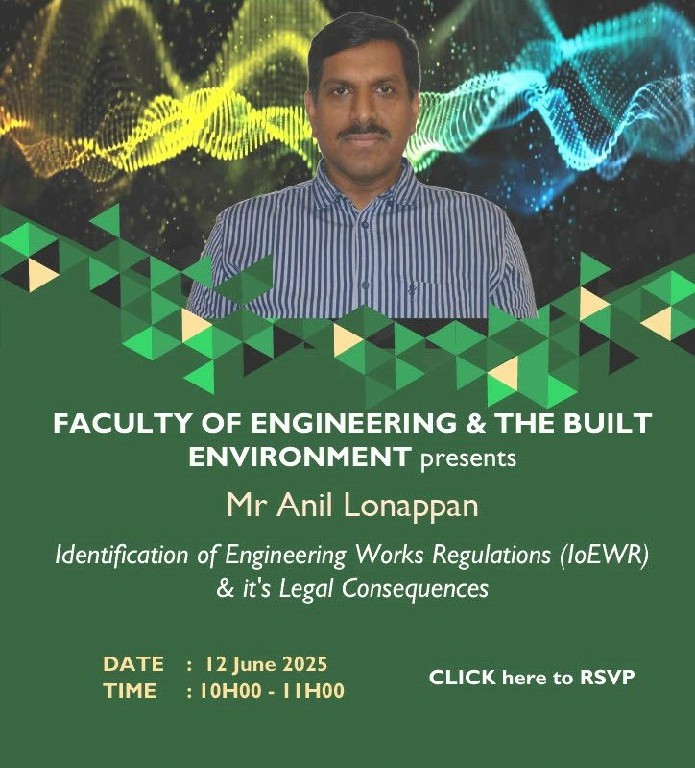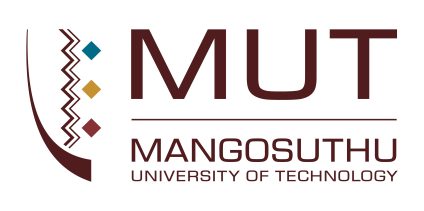 Anil Lonappan, a Lecturer in the Department of Electrical Engineering, has been invited to give a talk on “Identification of Engineering Works Regulations (IoEWR) and its Legal Consequences” at the Faculty of Engineering at the Durban University of Technology (DUT) on 12 June 2025. Lonappan, a member of six committees of ECSA (Engineering Council of South Africa), described the invitation from MUT’s neighbour as “an honour”. Lonappan explains that professional registration with ECSA is a mandatory legal requirement for anyone involved in engineering work in South Africa. Lonappan will give more information on this on 12 June. One of the points he will make is that ECSA must ensure that proper services are provided to its clients within the engineering organisation. “ECSA manages these matters by reviewing contracts, verifying practitioner records, inspecting sites and interviewing decision-makers. In serious cases the Council may publish the names of offending parties, suspend registration or refer matters for criminal investigation if fraud or public endangerment is suspected,” said Lonappan. Lonappan added that the purpose is to give effect to the IoEWR, and to safeguard the public by ensuring that those make engineering decisions with verified competence, ethical obligations and legal accountability.
Anil Lonappan, a Lecturer in the Department of Electrical Engineering, has been invited to give a talk on “Identification of Engineering Works Regulations (IoEWR) and its Legal Consequences” at the Faculty of Engineering at the Durban University of Technology (DUT) on 12 June 2025. Lonappan, a member of six committees of ECSA (Engineering Council of South Africa), described the invitation from MUT’s neighbour as “an honour”. Lonappan explains that professional registration with ECSA is a mandatory legal requirement for anyone involved in engineering work in South Africa. Lonappan will give more information on this on 12 June. One of the points he will make is that ECSA must ensure that proper services are provided to its clients within the engineering organisation. “ECSA manages these matters by reviewing contracts, verifying practitioner records, inspecting sites and interviewing decision-makers. In serious cases the Council may publish the names of offending parties, suspend registration or refer matters for criminal investigation if fraud or public endangerment is suspected,” said Lonappan. Lonappan added that the purpose is to give effect to the IoEWR, and to safeguard the public by ensuring that those make engineering decisions with verified competence, ethical obligations and legal accountability.
In his presentation, Lonappan will also focus on unauthorised practices by unregistered persons. This category deals with individuals who are not registered with ECSA but engage in Identified Engineering Work, and present themselves as registered professionals, or allow others to assume they hold registration status. “These matters often involve impersonation, misrepresentation in tenders or on social media and unlawful assumption of engineering responsibilities,” said Lonappan.
Given the threats posed by the unregistered and unprofessional individuals that take on engineering work, and the damage that could cause to the professional, and the benefits of being a member of ECSA, Lonappan advises that all those that plan of taking engineering tasks, must register with the organisation, a process he has called “roadmap to professional registration with ECSA. “To become professionally registered, individuals must first register as candidates with ECSA. This is similar to obtaining a learner’s driving licence. Full professional registration is comparable to a driver’s licence and must be renewed every five years,” Lonappan said.
The draft IoEWR regulations were circulated to all engineering sectors in 2013 for comments, suggestions, and objections. Since November 2024, ECSA has conducted nationwide roadshows to consult stakeholders on the IoEWR Framework. The final roadshow was held on 11 March 2025 in East London.
The IoEWR also applies to individuals involved in the planning, design, delivery, and assessment of ECSA-accredited engineering education and training programmes at the exit level. This includes programmes offered by higher education institutions established or declared under the Higher Education Act, 1997 (Act No. 101 of 1997).
